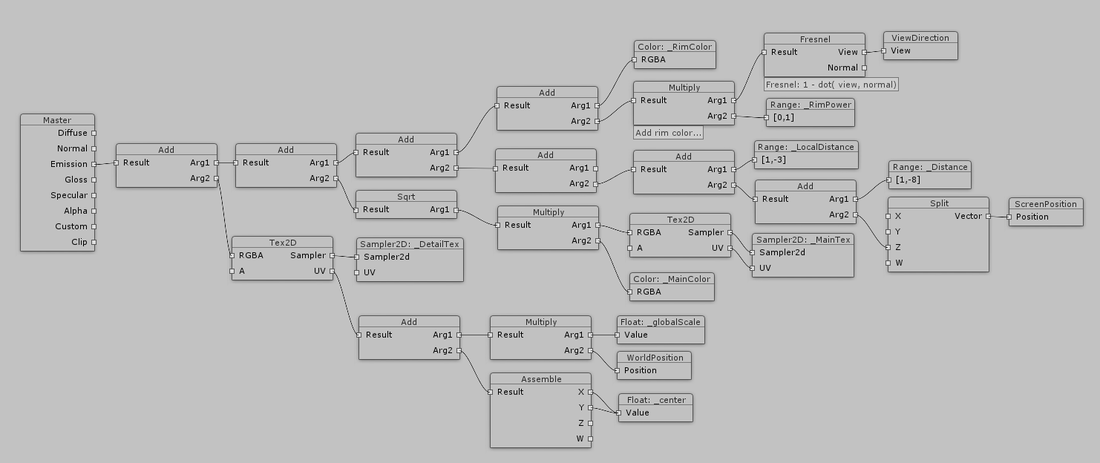|
I did some work on the shader. Nothing is optimized yet. By cobbling together the work of some really smart people I have arrived at this. This is the shader graph that makes the shader on all the objects in the video. I put it all together using Strumpy Shader Editor. It's really fantastic. I still need to go through it and clean up stuff that I don't need or Is just to complex. I expect to be able to trim that graph down quite a bit, but for now it's working and doesn't seem to be very costly. Works great on the android devices I have on hand. I have to check it on IOS, but there is nothing going on in there that most apple devices should have trouble with. Everything is looking more and more like I originally intended, which is sort of amazing since I didn't know if some of the effects would even be possible in realtime, let alone on a handheld device. Turns out most of it is actually pretty simple. I suppose most things are, after you do them. This is the part where all the graphics programmers out there get to snicker "newb" under their breath.
0 Comments
There are some things I don’t understand. Can’t understand, and probably won’t understand. I don’t think I have the tools to understand. I hope that I never do.
Here is a fun little story that I think makes me look very stupid, but, I think, makes my parents look unquestionably brilliant. We used to watch The Nature Of Things regularly on CBC. I was, as most children are, fascinated with science, technology, robots, spaceships, aliens, volcanoes, and dinosaurs. If there had been a show with robot dinosaurs, piloting a volcano through space meeting aliens along the way, it would have been my favorite show. In fact someone should probably get on that. Anyway, we used to watch The Nature of Things all through the 80’s. I have more than a few fond memories of laying on the carpet in front of a monolithic, wood clad, television tube, thoroughly entranced. Occasionally I would be allowed to stay up late to watch a particularly interesting episode that aired later than intended, usually due to a hockey game running long. Any episode that centered on robots, computers, or dinosaurs could usually hold bedtime off for a spell. As I got older and more of my evening time was spent at the rink, I would only watch the show sporadically. Usually, an episode about robots or computers or dinosaurs that would catch my attention, since I am perpetually locked at a mental age of 8-12. This time though, the topic of the episode was the human genome project. The projects goal to map out the entire human genome was not yet complete, so this episode aired sometime in the early 90’s. That means I was in my mid teens. The host of the show, David Suzuki, told a story about how he became interested in science, nature, and most importantly, genetics. He described how his father had fostered in him an interest in nature, and exploration. He also went on to describe how he and his family had been placed in an internment camp during WWII. Listening to him recall this troubling story, at the age of at least 15 or 16, I realized that David Suzuki was japanese. - I have read a lot of the #1ReasonWhy and #1ReasonToBe comments on twitter. Most of them posted by women in the game industry, or women who comment on the game industry. Seriously, go and read some of these. When taken in aggregate, it paints a pretty bleak picture. What should be done? What can we do to improve this situation? Why did it take until my mid teens for me to realize that, David Suzuki, a man I watched explore the natural world as often as weekly, was japanese? Of course, David Suzuki is not japanese. He is canadian. As canadian as I am. As japanese as I am scottish/irish/french mutt. He’s more canadian, If you take seniority into account. Aside from having the same last name as a cool motorbike, he was that science guy on TV. In other words, he was someone that I could aspire to be like, emulate, if i chose to. That is all the information my spongy young brain had to go on. That was how my parents let me picture the world. That a family could have their business and possessions taken from them, that they could be imprisoned due to a minuscule variance in their genome, simply did not exist for me. That a girl couldn’t grow up to be an astronaut or an engineer, or a game developer did not exist. Maybe that was something that happened in a long gone, barbaric past, but we lived under the banner of the federation of planets. People were all basically equal. Only their circumstances were different. If you lived next door to me, we share the same circumstances, regardless of where you were last week, so we should probably go play Star Wars and Transformers. I realize that claiming ignorance of racism, or sexism, means that I am guilty of some unique form of both in some peoples eyes. I feel the positives outweigh the negatives. We try to make sure that our sons image of the world is this: Most people are good, but some aren’t, so be careful. We are mammals, just like a lot of other animals. We do a lot of the same things. People come in different shades of brown and orange, just like other animals. People believe different things, but mostly for the same reasons. We like to live together peacefully, but sometimes we don’t. We speak different languages, but say the same things. Most of the time boys fall in love with girls, and vise versa, but not always. Be curious. Ask questions. Good scientists ask questions. They don’t always get answers. Do what you like doing, help other people do what they like doing. Some day, when their brains are nearly fully formed, they will hear a story about how one group of people discriminated against another. They will comprehend the history, and they will be able to empathize with the story in the abstract, but they won’t really understand. They will realize that they never understood, and now, having grown and experienced the world, the will know that they don’t have the tools to understand. I hope, that like me, they see it as a gift. #1ReasonToBe So that my sons grow up never knowing the difference. Really short update today.
I’ve just been doing some more work on creating and setting up models for import into the game. UV unwraps, zeroing out transforms, organizing materials, that sort of thing. I have a couple of longer post and Best Games in various states of construction, but none of them felt done enough to post today. I’ll polish one of them up for next week. If anyone is interested in any longer technical writeups, something on modelling or maybe a video on some topic, let me know. I would like to try doing a video on some topic, but every time I think of something, I always go “nah. that would be boring”. I’ll let you be the judge, what would you not find boring? I recently played The Room. My son is currently obsessed with it. On its face it seems to be a puzzle game, but as I played with it, I realized that it was actually something quite different. It's a discovery game.
The setup is this. There is a finely crafted safe sitting in an otherwise empty room. Sitting on top of the safe is a note giving you a bit of a narrative push. You're off. You work various ornate mechanisms to obtain access to the safe. Once inside, you reveal even more ornate mechanisms. This pattern continues until you begin to question the internal volume of the original safe. New stuff just keeps popping out of these contraptions. Clearly there are some tardis-like shenanigans going on here. What struck me as interesting while playing it was that there doesn’t seem to be any actual puzzles in this “puzzle” game. Nothing makes you think very hard, or reason out a solution to a problem. The methods of opening, cranking, or manipulating each of the devices are handed to you. If you manage to get hung up for more than a few seconds on any device, the games hint system will just flat out tell you what to do next. The game succeeds or fails based only on discovery. It got me thinking about a lot of other games or game systems that use discovery to keep you playing. I did what I usually do when something like this strikes me, I combed the internet for articles written by smarter people than me. Turns out that studying the effects of novelty (novelty seems to be the commonly accepted term) on brain chemistry is pretty popular. Novelty, or discovery, drives our dopamine production in a big way. Novelty seeking behaviors, and maybe full on novelty addiction, seems to be hardwired into us. If I had to guess, I would think that novelty addiction doesn’t come as a surprise to anyone reading this. You are, after all, reading this on the internet, which is, more or less, a novelty factory. The word addiction brings up a lot of negative connotations. I suppose you could say that people are addicted to conversation and social interaction, since we don’t actually require them to survive, but most of us would suffer from severe mental and physical withdrawal if they were taken from us. Novelty, it seems, is of similar importance. Our brains reward us for doing things that are good for us, like eating, by producing dopamine. You know what else causes our brain to produce dopamine? Discovering new things. Novelty. I’ll extrapolate a bit. Learning new things makes us happy. So here we have a game, that challenges the player in no real way, and yet, is compulsive as hell. There are a lot of other games that incorporate discovery as one of it’s systems. Usually, games will oscillate between a discovery phase, early exploration in civ for example, and a strategy phase, like dealing with your cities in civ. The Room does away with any other phases and focuses only on discovery, or novelty. And it works. So what did I learn? I’m not exactly sure. Investigation is ongoing, but I do know that I will be considering discovery as game mechanic from now on. |
Archives
February 2024
Categories |
Owen McManus


 RSS Feed
RSS Feed